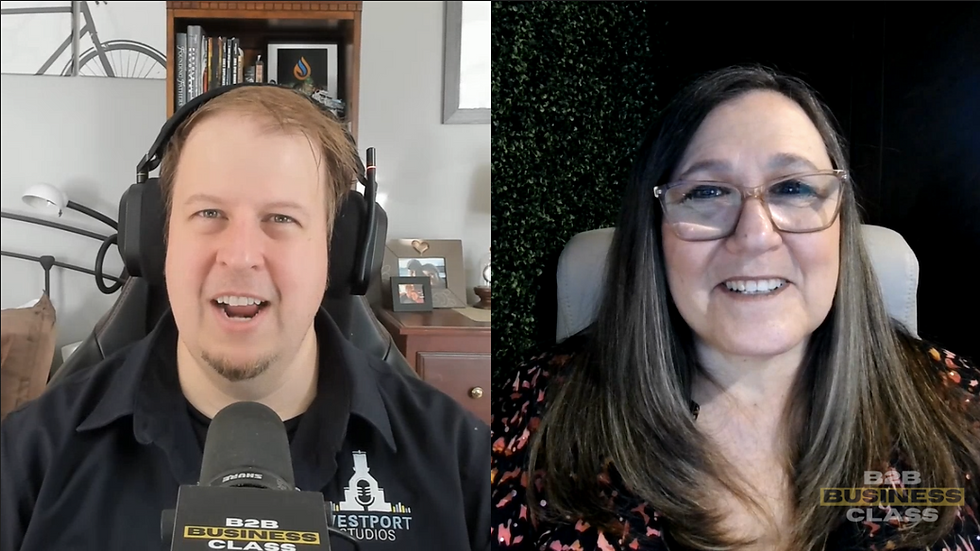Remote Teams: What to Watch for When Outsourcing
- Robb Conlon

- Apr 13, 2025
- 3 min read

For entrepreneurs considering global talent sourcing, managing remote teams can feel like both an opportunity and a risk.
In this episode of B2B Business Class, Clarisse Viduya, Principal Strategist at Essiralc Marketing, joined me from Barcelona to unpack the nuances of building and leading a fully remote team.
Her experience working with contractors and freelancers from around the world sheds light on the practical, cultural, and ethical considerations that business owners should keep in mind before outsourcing.
Outsourcing Isn’t a Shortcut — It’s a Strategy
Clarisse runs a 100% remote social media agency built around global talent, with a majority of her team based in the Philippines.
She’s upfront about the challenges that come with outsourcing: differences in work ethic, communication, and cultural norms can easily lead to misunderstanding if not proactively addressed.
But that doesn’t mean remote talent is unreliable or less skilled — just different.
“In the U.S., respect is earned, not given,” Clarisse explained when highlighting how cultural dynamics shape communication styles and expectations. “ Whereas, in the Philippines, respect is given to anyone older than you.”
She unpacked how, in Filipino work culture, for example, “yes” might mean “I hear you” rather than “I agree and will do that.”“How can you rely on someone if they’re only saying ‘yes,’ but the answer is really ‘no’?” Clarisse opined. “I teach my staff that if [something] doesn’t make sense, tell me.”
Bridging these gaps requires intentionality — not assumptions — and the willingness to learn how different cultures operate.
Her approach isn’t about forcing Western values but about aligning values across teams. That might mean teaching overseas hires to express disagreement more openly or removing hierarchical formalities from team communication.
“I actually teach my team to be more American-like,” Clarisse says, referencing how she encourages open dialogue and autonomy within her organization. “I [work on] bringing awareness that there are differences.”
Compensation that Reflects Respect
One of the more surprising practices Clarisse uses is letting job candidates tell her what they want to be paid.“Their work is going to be judged based on their output and the amount that they're charging. And then, that's how we usually make our hiring decisions.”
It’s a refreshing departure from top-down salary models and one that promotes fairness without creating economic distortion.
For example, paying a Filipino worker U.S.-level wages might feel like “the right thing to do,” but Clarisse urges caution.
“A full-time salary of $30 an hour is the equivalent of about 250,000 pesos a month,” she said. “Who would earn this salary [in the Philippines]? Doctors — maybe lawyers or engineers.”
Overpaying, she explains, can create unintended social and professional consequences in local economies.
Instead, she evaluates candidates based on the quality of their work relative to their proposed rates.
The result? A more balanced, ethical approach to global compensation.
Reliability Equals Communication
When it comes to remote teams, what often gets labeled as “unreliable” behavior may actually be a communication breakdown.
In many cultures, especially hierarchical ones, employees may hesitate to challenge authority — even when they’re unsure of instructions. To the uninitiated outsider, that reluctance can be mistaken for positivity.
“If you just get someone who says ‘yes,’ they may hate you because Filipinos don’t speak out,” Clarisse says. “They don’t want to speak up, so they just disappear.”
Her solution? Establish a safe space where team members are empowered to ask questions, push back, and be honest about their capacity. “Give them the autonomy to be able to speak up for themselves,” she suggested. “It’s not the norm for them… so discuss it.”
Be the Boss You Wish You Had
Perhaps the most resonant takeaway from Clarisse’s interview was her philosophy on leadership — be the boss you wish you had.
That means giving your team ownership, creating room for their ideas, and building trust by default.
“I don’t want a team if I can’t [help] them feel valued,” she says. “ I want to hear how we can be better. I don’t want to be the only one teaching you. You're teaching me and teaching each other.”
It’s a philosophy that has allowed Clarisse to run her agency from anywhere in the world, from Texas to Thailand to Spain, while building a workplace culture of which her team is proud to be a part.
Clarisse’s insights show that remote teams aren’t a shortcut for cheap labor — they’re a long-term investment in global talent and mutual growth.
“If it can be done remotely, why not give them that freedom and that trust?” Clarisse implied. “I think that great work can be done from anywhere.”
For more insights from Clarisse Viduya, you can listen to this episode of B2B Business Class on Spotify, Apple, or wherever you get your favorite podcasts.




Comments